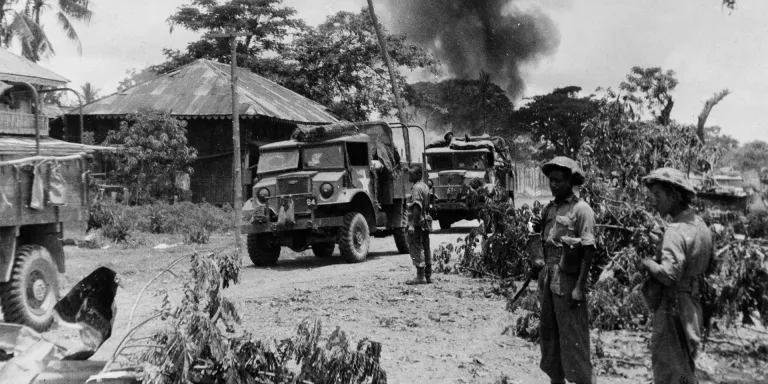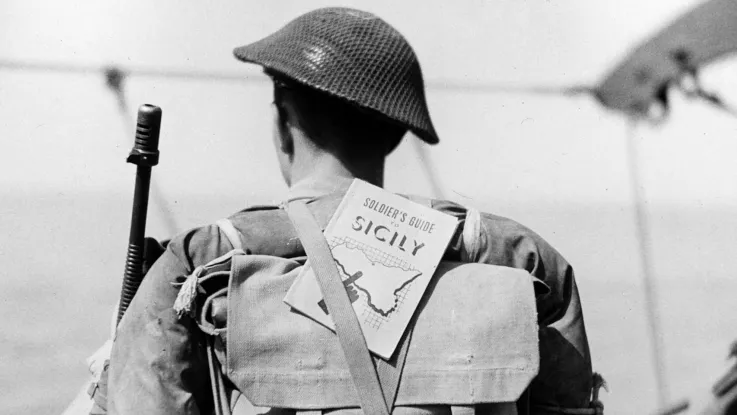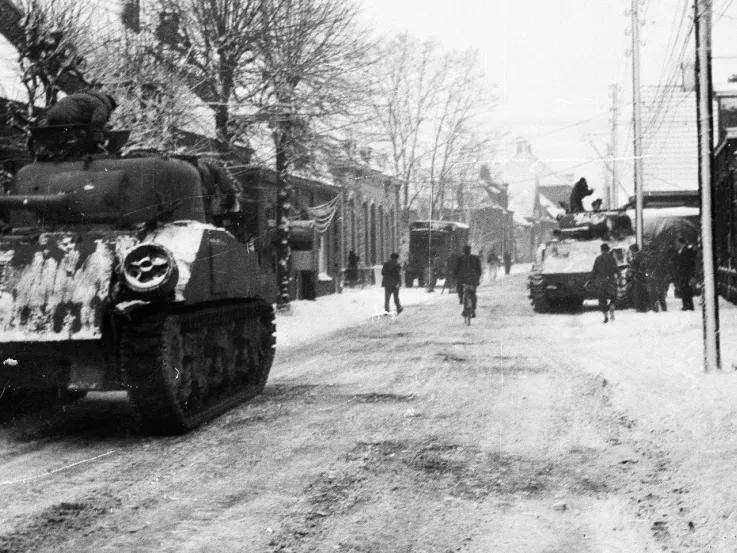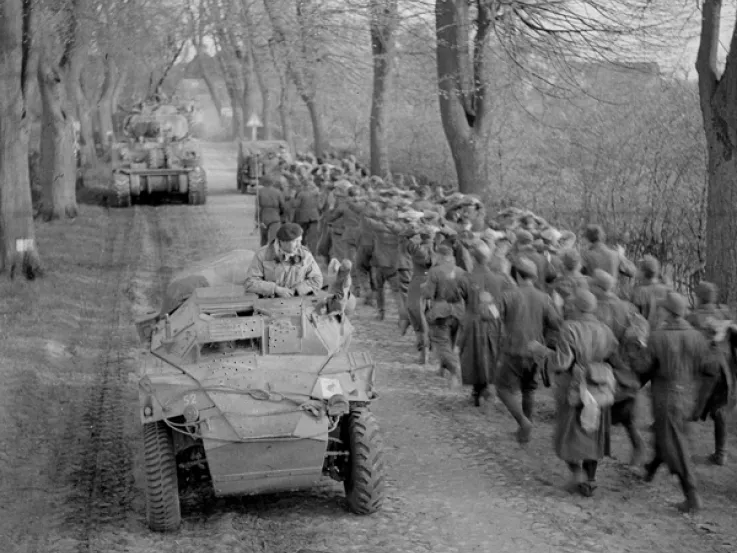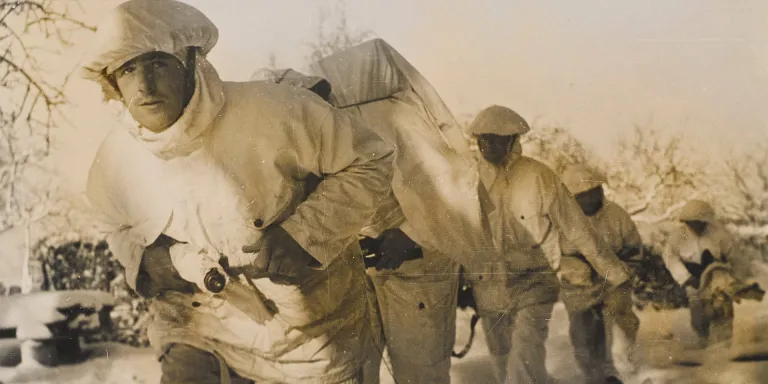
British Army Commandos in the snow, January 1945
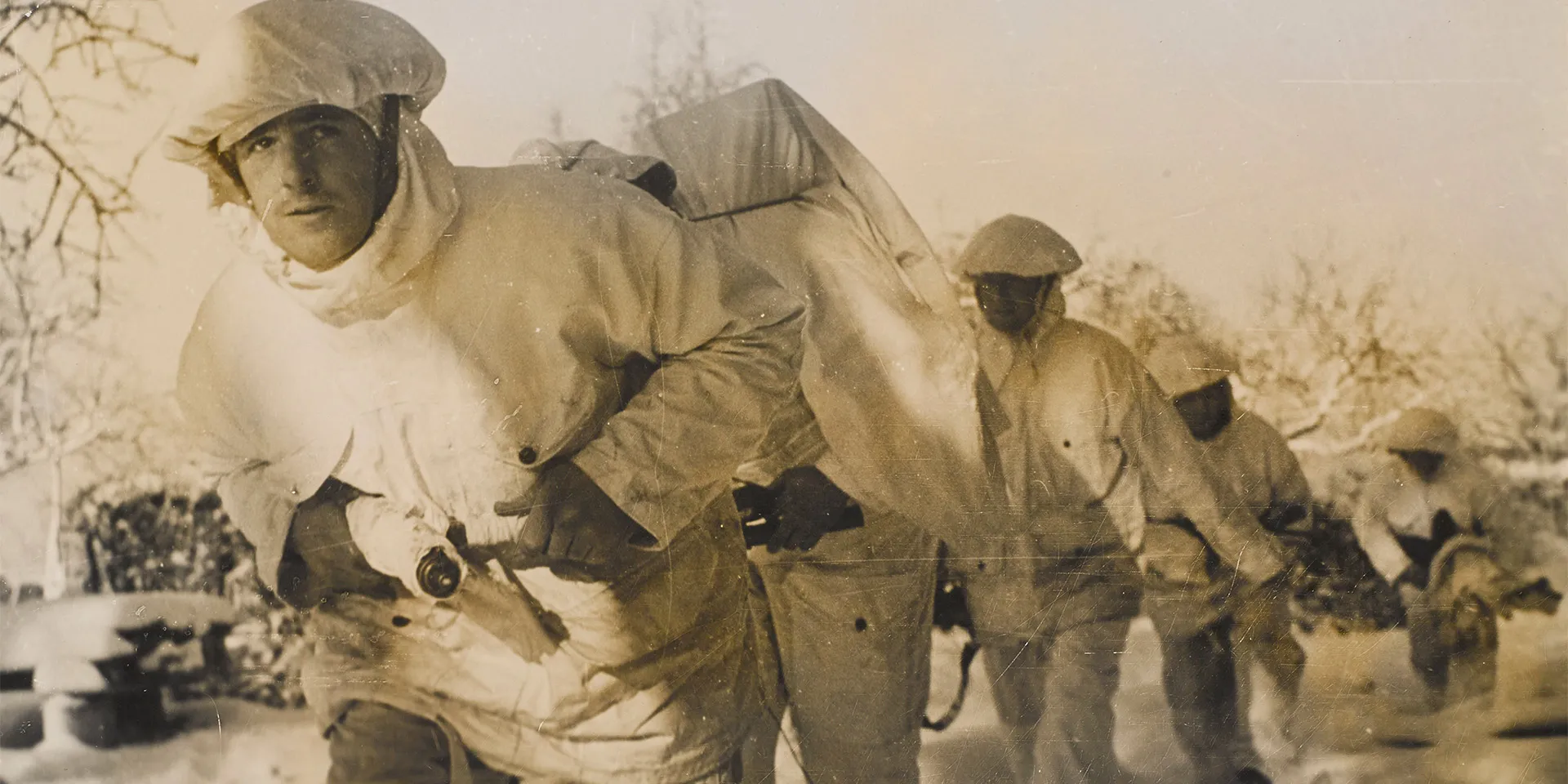
The British Army in 1945
The year 1945 was one of the most decisive in modern history. The defeat of the Axis powers - Germany, Italy and Japan - finally brought the Second World War to an end. But alongside the joys and aspirations that came with victory, the transition from war to peace was fraught with complex and unforeseen challenges. The trials and tribulations of 1945 would fundamentally reshape the world and leave a legacy for generations to come.
The British Army stood at the very heart of this momentous story. As the war came to an end, Britain's soldiers became conquerors, liberators, occupiers, peacekeepers, imperial governors and much else besides. This was an army of millions from across the globe, men and women of diverse backgrounds all of whom would play their own part in a historic year.
‘The operations of the Allies on all fronts have now brought the German war to its final stage. There was a time, some years ago, when it did not seem possible that we could win this war; the present situation is that we cannot lose it: in fact the terrific successes of our Russian allies on the eastern front have brought victory in sight.’
Personal message from the Commander-in-Chief, Field Marshal Montgomery, to all troops of the 21 Army Group - February 1945
Indian troops in Burma during the last few miles of the advance on Rangoon, April 1945
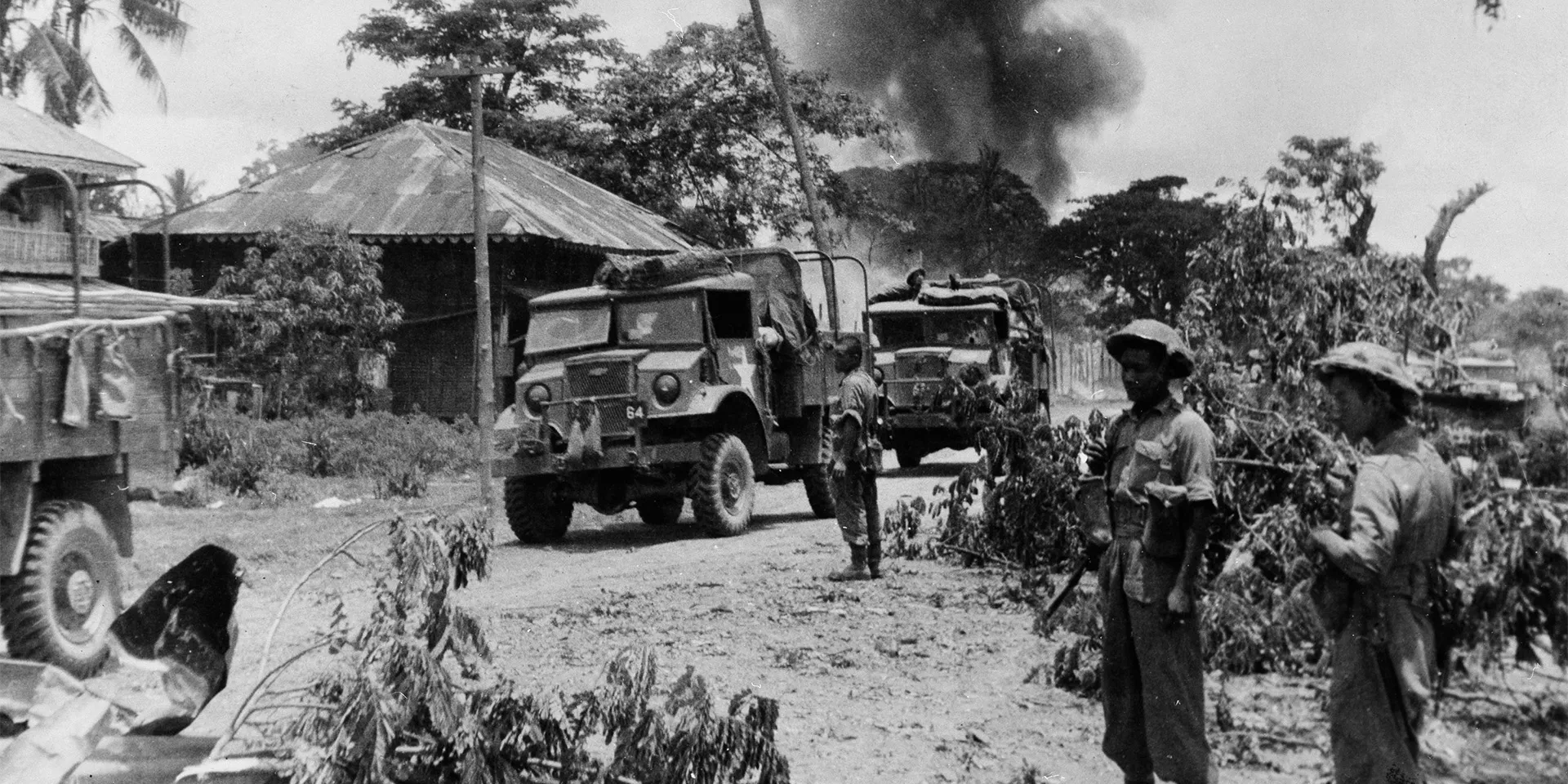
Allied advance
The advance of the Allies during the early months of 1945 brought about the complete destruction of the German Army and forced Japanese forces into a full retreat. At last, the end of the Second World War was in sight.
In North-West Europe, the British Liberation Army fought through Belgium and the Netherlands. In March, Allied forces embarked upon the invasion of Germany with British soldiers capturing the Rhineland and the Ruhr, including major cities such as Hamburg. With US forces sweeping through Bavaria and the Soviet Union's Red Army driving towards Berlin, the conquest of Nazi Germany was almost complete.
In Italy, British Army units that had fought from North Africa to Rome made one final push: the Spring Offensive drove the German occupiers out of northern Italy and ended the war in the Mediterranean. By the end of April, the once-mighty German war machine was no more, Mussolini and Hitler were both dead, and Victory in Europe was only days away.
Meanwhile, Japanese forces were on the defensive across eastern Asia. In Burma (now Myanmar), troops of the British and British Indian Armies made great strides in battles with the Japanese. By the beginning of May, the capital Rangoon (now Yangon) was once again under Allied control.
This marked a major defeat for Japan. If the war in the Far East was not yet over, especially with the prospect of an invasion of the Japanese mainland on the horizon, an Allied victory was all but secured.
‘The desolation increased as we approached the Rhine, whole villages were in ruins […] and the last town was a horrible mess of rubble, yet the people were returning and trying their best to scratch their belongings out of the rubble and make do as best they could.’
Sergeant Samuel Bates, Royal Signals, in a letter to his wife - April 1945
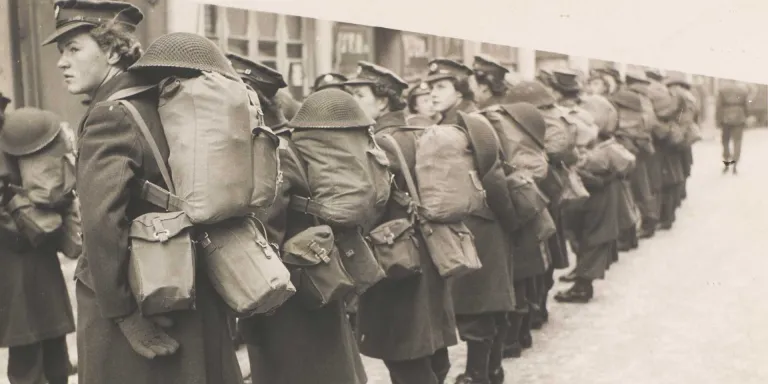
Women of the Auxiliary Territorial Service on their way to join the British Liberation Army in Ostend, Belgium
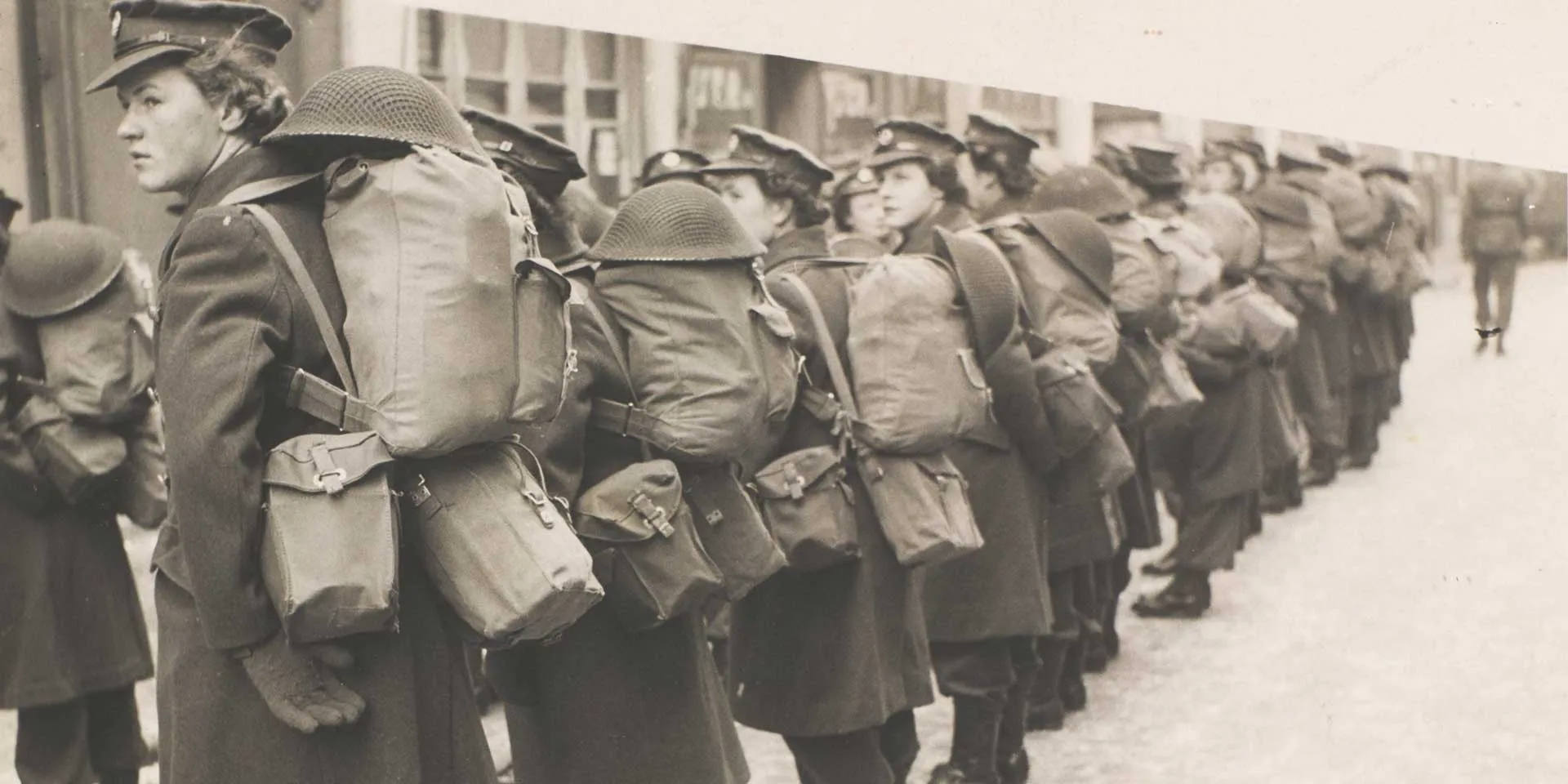
Behind the lines
Across the world, the rapid advance of the Allied armies brought huge demands upon manpower and logistics. Alongside those directly involved in the fighting, millions of men and women were engaged in the administration and maintenance of the British Army behind the front lines.
In early 1945, as more and more territory came under the control of the Allies, British soldiers were also tasked with upholding order, rebuilding essential services, and planning for the handover to civilian governments.
For many troops on the front lines or stuck in prisoner-of-war camps, the hope of simply making it home alive became their main preoccupation. Yet for others, the possibility of a first posting abroad or the opportunity ‘to do their bit’ as the war approached its climax was an exhilarating, if daunting, prospect.
From witnessing the horrors of war to performing pantomimes, the more than 2 million soldiers of the British Army had a unique vantage point upon the final months of the conflict.
‘I believe that in the history of the world, there has not been a more genuinely democratic struggle for freedom than ours.’
Indian independence leader Mahatma Gandhi’s ‘Quit India’ speech - 1942
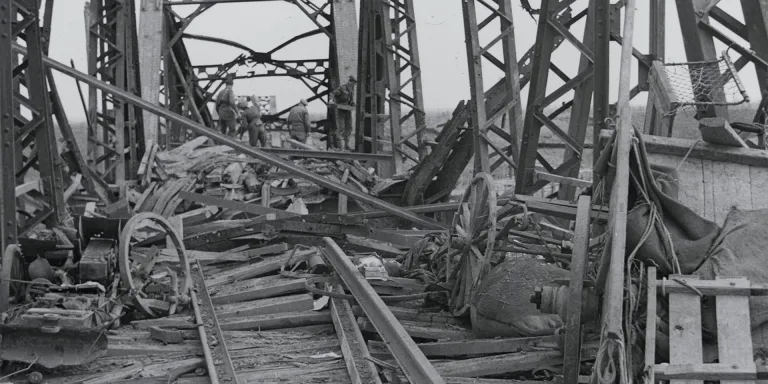
Abandoned weapons and vehicles cover a railway bridge over the River Reno in Italy, April 1945
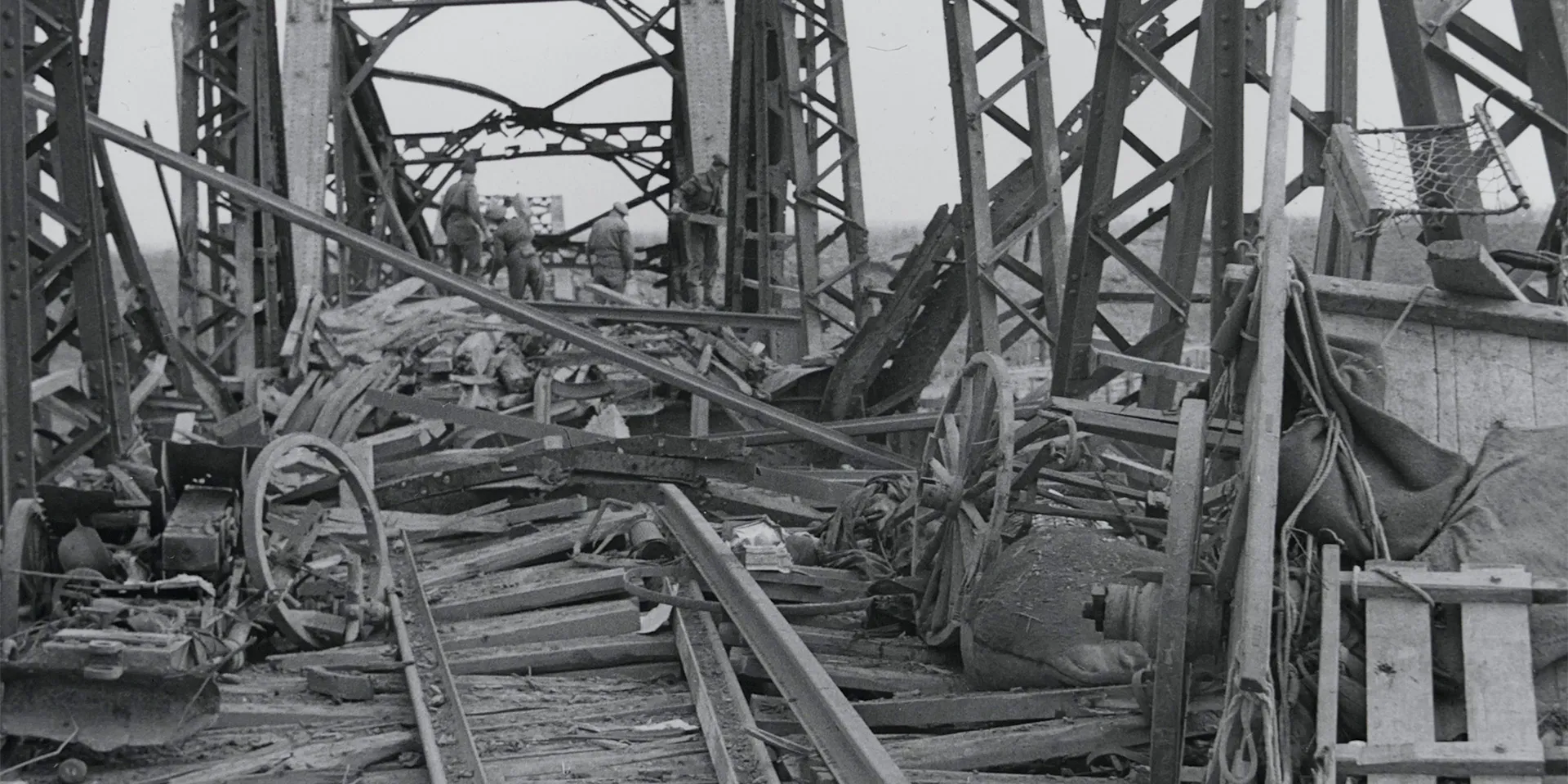
An uncertain future
As the Second World War came to a close, there remained a great deal of ambiguity about what would come after military victory was achieved. In liberated and conquered territories, the scars of battle as well as the complex questions of recrimination were everywhere to be seen. Across Europe, the discovery of concentration and extermination camps brought a heightened demand for justice against the perpetrators of wartime atrocities.
In some countries, like France and Belgium, the path to a new, democratic government was relatively clear, even if questions of complicity and collaboration with former Nazi occupiers were bound to prove challenging. But elsewhere, most obviously in Italy and Germany, the future was shrouded in uncertainty; for the time being, British and Allied troops were to take charge of civil affairs. Likewise, there was little clarity on what would become of Eastern Europe now it was free from Nazi occupation.
In the spring of 1945, there were few guarantees of peace. From Greece to the Middle East, local conflicts over who ought to take power loomed in the shadow of the impending Allied victory. The precise shape of the postwar world was yet to be determined.
In the face of powerful, long-standing anti-colonial resistance movements in India and beyond, the British Empire looked to be on its last legs. Yet in Africa and the Far East, the revival of British colonial rule remained a very real possibility. Meanwhile, the future durability of the alliance between Britain, the USA and the Soviet Union was a matter of much debate.
These deliberations over the British Empire and the balance of power in Europe would impact the lives of millions across the world. They would also have a huge bearing upon the future size and purpose of the British Army.
‘The establishment of order in Europe and the rebuilding of national economic life must be achieved by processes which will enable the liberated peoples to destroy the last vestiges of Nazism and Fascism and to create democratic institutions of their own choice.’
Declaration on Liberated Europe, agreed by Churchill, Roosevelt and Stalin at the Yalta Conference - February 1945
Exploring solutions
In February 1945, the leaders of the ‘Big Three’ - the United Kingdom, the United States and the Soviet Union - convened at Yalta, on the Crimean peninsula, to discuss the issues set to confront the world after the final defeat of the Axis powers. From the fate of enemy territory and the future borders of Europe to the pursuit of justice for the war’s victims, there was much to be resolved. Yet, with the conflict still ongoing, permanent solutions were in short supply.
There was agreement on the need for a military occupation of Germany and Austria, to which Britain would contribute thousands of soldiers. In addition, the Allies finalised the details of the United Nations organisation and agreed Poland’s new, expanded frontiers.
But, for now, the primary focus was still on winning the war. The complex questions surrounding the peace would have to wait.
On This Day: 1945
This story sets the scene for a new series exploring the British Army's role in 1945 - one of the most decisive years in modern history - drawing upon the National Army Museum's vast collection of objects, photographs and personal testimonies.
Throughout 2025, a new instalment will be released each month that focuses on events from 80 years beforehand. The series will highlight the everyday experiences of Britain’s soldiers alongside events of grand historical significance.


